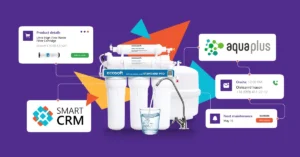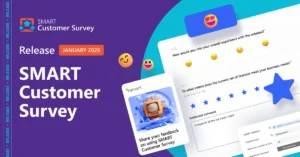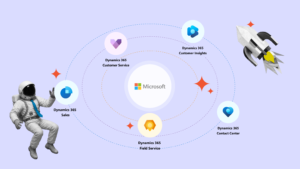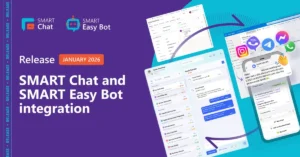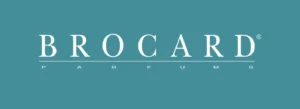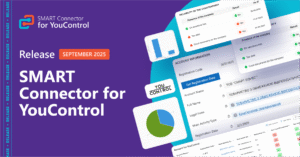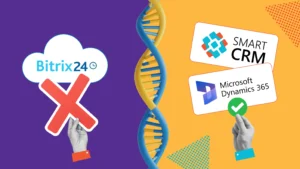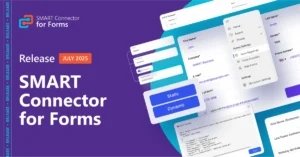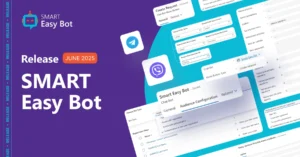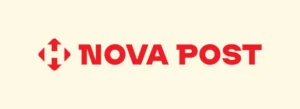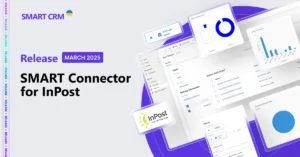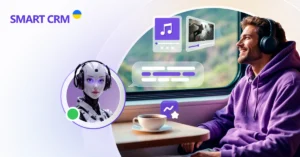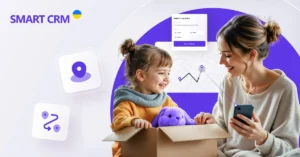CRM for the service industry: how to be one step ahead of your customers’ needs

CRM is a software product that emerged in the 90s of the previous century in response to the demand of businesses that were looking for ways to reorient themselves from product-centricity to customer-centricity.
The 2000s were marked by its active distribution, and already in the early 20s it confidently took the position of bestseller.
Thus, according to the results of 2021, the well-known American consulting company Grand View Research estimated the total annual profit from sales of CRM systems at $ 48.7 billion and predicted that by 2028 it would grow annually by 14.2%.
Why? First, because for a business focused on the end consumer, the timing for them was perfect. In addition, according to Nucleus Research, the average return on investment in this software is up to $ 8.71 for every dollar spent. And business always counts.
What is special about CRM for the service industry
A CRM system for a business operating in the service sector is classically designed to manage its relationships with existing and future clients. And one of the main tasks is to help companies build long-term relationships with them based on high trust and loyalty.
In the service sector, CRM for service providers is much more than just a contact management tool, because here it is especially felt that the client is the main asset of the business. Reducing operating time due to the implementation of service business CRM is perceived here as a real opportunity to free up staff time to focus on the needs of consumers. In particular, on creating new services that do not simply meet the needs of clients but work to anticipate them.
Proactively solving consumer problems enriches both parties: the business opens up new opportunities for its own development due to the creation of new services, while the consumer, along with the services, receives confirmation of his or her own importance for the service company and a unique customer experience.
Thus, a CRM in the service sector is much more than a classic software product. This is a comprehensive solution that provides data collection and analysis for their effective use to achieve the mission of a customer-oriented business.
Functional modules and capabilities of CRM for the service business
When assessing the functionality required for CRM in the service sector, you need to understand that its main task is to turn a service into a product that can generate profit.
Therefore, when choosing a CRM for service business, it is important to clearly define the requirements for both the basic functionality and the “specific” functionality dictated by the characteristics of the sector.
This specificity is due to the fact that for companies operating in the service sector, in particular, it is important to quickly respond to customer needs, adhere to schedules and ensure effective logistics.
Basic requirements for service industry CRM functionality
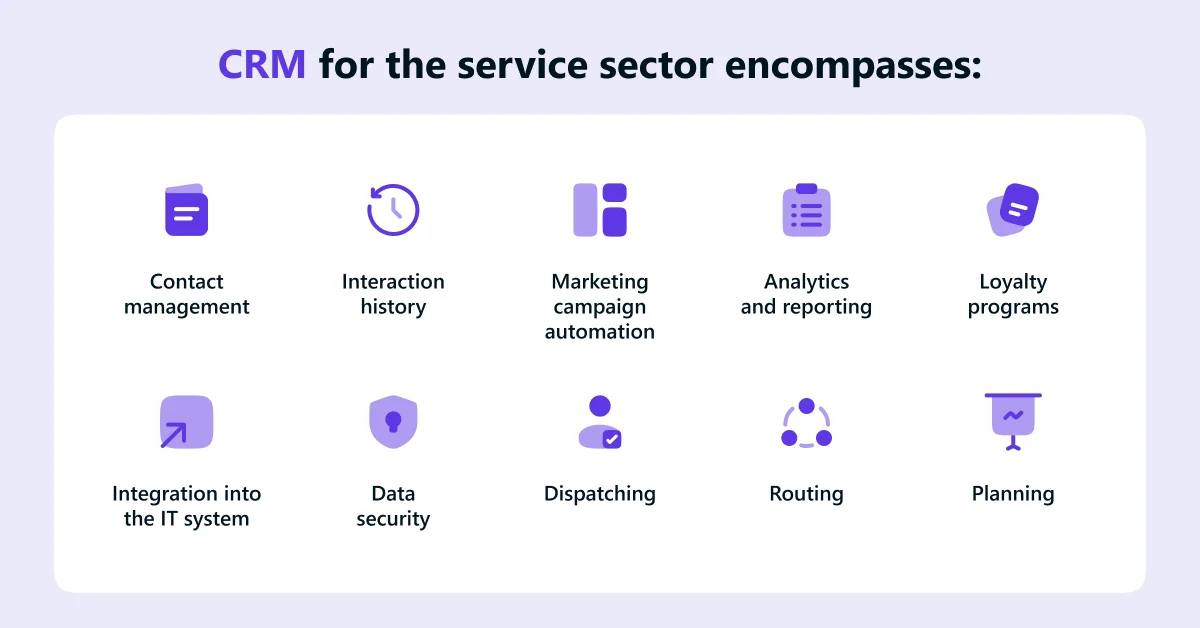
Contact management
This is one of the key functions that provides centralized storage and organization of information about service consumers. It allows businesses to collect, structure customer data and analyze it to make decisions that can take interaction with service consumers to a qualitatively new level.
Interaction history
Thanks to the implementation of this function, you can store, track and analyze information about all interactions with clients, such as the name of the service, order date, cost and order channel, contact with the support service and much more.
Analysis of this data allows you to better understand consumer behavior and, thanks to this, improve the level of their service.
Also, a CRM system relevant to the service industry combines information about consumers with tools that automate the process of servicing them. As a result, the time spent on “manual operations” is reduced and the number of errors is minimized due to the elimination of the human factor.
And integration with the system for recording customer requests allows the business to understand which services can cause problems and require improvement.
Customer segmentation
The CRM for service-based business allows you to distribute all clients into groups according to selected criteria. Thus, based on the history of service consumption, service industry CRM allows a business to summarize the habits of consumers of its own services. And this is an opportunity to understand how often a particular client orders or uses a service; what categories of services they choose and whether, say, seasonality, time of day or any other factors influence this choice; how much money they spend on them on average (per year, month).
Based on this data, consumers are segmented and personalized recommendations and offers are created, including the purchase of related services.
This is also an opportunity for a business to introduce a proactive service based on a forecast of the future needs of individual categories of consumers.
The importance of a personalized approach to clients is noted by a number of consumers’ sentiment researchers. Thus, according to McKinsey research, 71% of surveyed consumers expect personalized offers from businesses, and 76% feel extremely disappointed if they do not receive them.
Marketing campaign automation
Allows you to improve the processes of creating and conducting marketing activities. This feature is designed to relieve marketing department staff of unnecessary routine and significantly increase their efficiency.
Analytics and reporting
The CRM for the service industry provides effective tools for tracking and analyzing the results of marketing campaigns in real time. Thus, it allows you to optimize the costs of their implementation due to the prompt adjustment of activities based on the assessment of the effectiveness of individual campaigns in real time.
Loyalty programs
Based on the history of requests, the CRM for service business can manage loyalty programs, awarding points according to the established logic or offering exclusive discounts on certain services.
And, of course, a high-quality CRM system should be easily integrated into the existing IT ecosystem of companies and meet international data security standards.
The presence of any CRM tools will provide an additional competitive advantage for a service business, taking into account its “specific” needs
However, the presence of all the listed capabilities alone is not enough for a CRM system to be recommended for implementation in the IT ecosystem of a company operating in the service sector.
Here, the implementation of “specific” functionality is also essential. Here we are talking about the following capabilities:
Dispatching
This is the distribution of tasks between employees or departments of the company in accordance with their availability (involves determining which of the employees has the time and opportunity to serve the client); qualifications and location (determining which of the available specialists is able to solve the problem in the most qualified manner, with the least involvement of additional resources and in the shortest possible time).
This function is important for companies that need a quick response. These are various service departments; companies organizing courier delivery; technical maintenance services.
It is implemented thanks to automated dispatching tools. The system determines the closest available specialist to the client in real time and automatically sends them the task. Here we are talking about:
- monitoring the workload of employees in real time,
- automatic distribution of tasks based on selected criteria, such as availability, estimation of the time it takes the employee to get to the client’s location,
- tracking the status of task execution: allows managers to control the process and promptly adjust it at any stage of order fulfillment in the event of a delay or emergency.
Thanks to dispatching, the time required to service orders is reduced, staff workload is optimized, and timely provision of services is ensured, which significantly increases the level of customer satisfaction.
Routing
This function in CRM systems helps to optimize the routes of workers, which is especially important for companies whose specifics are associated with numerous trips to customers. In particular, we are talking about logistics companies, technical and service support and delivery services.
How is this implemented? CRM with a routing feature usually uses integration with GPS maps. This allows you to optimize delivery routes and, as a result, reduce fuel consumption, depreciation of vehicles and save time.
The routing function involves:
- automatic routing based on customer location data and the presence of other orders,
- route optimization taking into account traffic and pre-planned stops,
- analysis of historical data, helping to determine the most effective routes for regular trips.
This feature allows you to reduce business costs by increasing the accuracy of fulfilling orders for delivery or provision of services and reducing waiting time for customers. As a result, profits increase not only due to the “arithmetic” of savings, but also an increase in the level of customer loyalty, receiving a positive customer experience.
Planning
The planning feature in the CRM for the service industry allows you to organize the schedule of orders for employees taking into account the needs of customers and available resources.
This is especially important for companies that provide services by appointment, such as clinics, service stations, beauty salons.
Planning functions in service business CRM can include:
- interactive calendars and schedules that allow you to quickly distribute tasks between employees,
- synchronization of customer and employee records in the calendar,
- automated reminders for customers and employees to reduce the likelihood of missed appointments.
The presence of this feature ensures efficient use of the company’s employees’ time and reduces the number of errors and missed appointments, therefore boosting customer satisfaction due to adherence to schedules.
All three of these components, working together, provide a holistic approach to organizing work processes in a service company and help increase customer satisfaction.
Some of these tools, if necessary, are integrated into current business processes to automatically update invoices and other financial documents for the convenience of consumers.
How a solution from SMART business helped combine tradition and innovation in a unique space for family recreation in Lviv
SMART business has a whole stack of solutions in its portfolio, including service business CRM software, that help companies around the world effectively manage business processes, thereby increasing their own productivity.
A good example of such cooperation is the implementation of CRM tools to automate the work of the LEOLAND sports and entertainment complex in Lviv.
LEOLAND is a unique project designed to combine meaningful leisure with active sports for the whole family. On an area of 30 thousand square meters, there are 7 educational stations offering a wide range of activities for children – from scientific laboratories to an early development football center and an active entertainment park. For adults, there is a premium fitness club, tennis courts, a swimming pool and a SPA zone. On top of that, there are a movie restaurant, a cyber arena and a few different restaurants, including a healthy food establishment.
Such a number of active locations implies a large flow of visitors daily, each of whom requires special attention and deserves to be informed in a timely manner about changes in the operating hours of favorite attractions, the availability of zones or the emergence of new offers that are attractive specifically for them.
With the goal of expanding the possibilities for effective interaction with regular visitors and for increasing the customer base, they decided to introduce Microsoft Dynamics 365. And to establish effective communication with clients, a number of connectors were integrated into the solution: SMART Connector for Binotel, SMART Chat, SMART Easy Bot, SMART Connector for eSputnik and SMART Connector for GMS.
As a result, the company was able to effectively communicate with visitors in a convenient format and through a channel familiar to each; record and analyze requests to the customer center; analyze preferences and generate personalized offers. And the unification of all communication channels in a single window together with an integrated chatbot made it possible to significantly speed up the processing of each request and relieve the staff.
This allowed the project, even though the opening took place amid the war, to achieve its business goals and become a center for family leisure that meets the needs of city residents and guests. At the same time, the center is increasingly taking on the social mission of supporting talented athletes and creating conditions for the creative and athletic development of children.
SMART CRM – a modern level of customer and partner interaction management
A CRM system from SMART business – SMART CRM – is a comprehensive platform for automation of sales, marketing and service. Our solution, in addition to the classic functionality, allows you to:
- create a single environment for working with consumers and save the history of interaction with them, regardless of which channel it took place in,
- establish simple and effective communication with clients in the channel that is familiar to them (WhatsApp, Facebook Messenger, Instagram, Viber, Telegram). At the same time, for the convenience of service workers, all messengers and a chatbot are combined in a single window,
- use configured integrations with popular payment systems and communication and delivery services in the process of customer service. In particular, we are talking about integration with PayPal, Rozetka, GMS/Infobip, eSputnik, delivery services Nova Poshta and Ukrposhta, IP telephony providers Binotel, Ringostat, Stream Telecom; connectors for UAPAY, monopay, Przelewy24.
However, this is only an incomplete list of additional features of our CRM system implemented to date. As a company that has been working in the market for 15 years, both with Ukrainian and international companies, we have enough expertise to adapt our solutions to the individual needs of each specific business.
Our solutions are not just an opportunity for enterprises to feel confident in the Ukrainian business ecosystem, easily and quickly adapting to extremely dynamic conditions. This is also an opportunity to scale up just as quickly and easily, including in foreign markets.
For example, Nova Poshta chose SMART Sales and SMART Customer Care solutions when it decided to scale up on the Polish market. Today we can talk about the success of the project. It is important to note that literally from the first days of work, the Nova Post brand has maintained a consistently high customer satisfaction rate in the new market.
Looking for opportunities to upgrade your business? Request a free consultation here.
